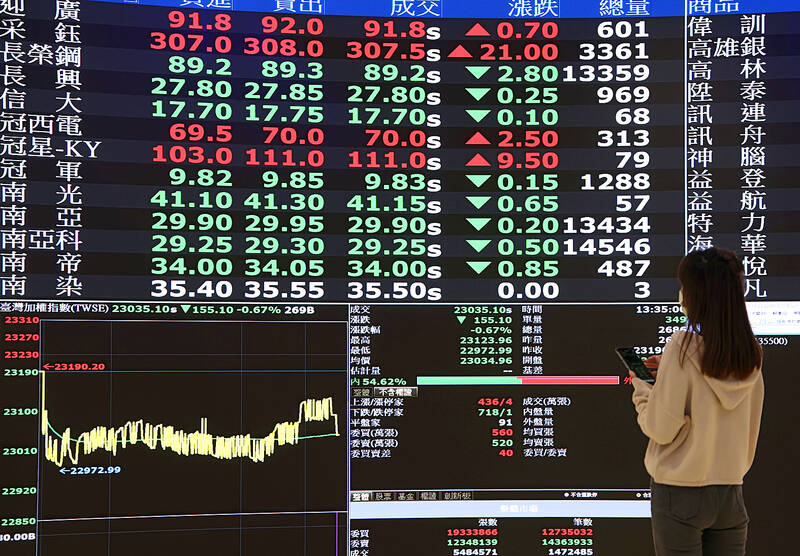Global index provider MSCI Inc yesterday announced it would increase Taiwan’s weighting across three key indices, as local shares perform well, driven by the artificial intelligence (AI), semiconductor and high-tech sectors.
Taiwan’s weighting in the MSCI All Country World Index is to rise by 0.02 percentage points, while it is increase by 0.14 percentage points and 0.13 percentage points in the MSCI Emerging Markets Index and the MSCI AC Asia ex Japan Index respectively, it said.
Following the adjustments, which are to take effect after the end of trading on Feb. 27, Taiwan’s weightings in the indices would rise to 1.96 percent, 20.16 percent and 22.89 percent respectively, it said.

Photo: CNA
The quarterly adjustments reflect price changes in component stocks and do not necessarily suggest capital movements in the market, the Taiwan Stock Exchange said in a statement.
However, the indices serve as market performance monitors, offering insights into Taiwan’s economic and industrial trends, it said.
The heavily tracked indices would also tweak the MSCI Taiwan components.
It would add printed circuit board supplier Elite Material Co (台光電) and Lotes Co Ltd (嘉澤), which makes connectors and other electronic components.
It would remove DRAM chipmaker Nanya Technology Corp (南亞科技) and Walsin Lihwa Corp (華新麗華), a maker of cold finished bars, it said.
Stocks added to MSCI indices would undergo a short-term price surge due to increased buying pressure from index-tracking funds. Stocks removed might experience selling pressure as funds adjust their portfolios. The total number of MSCI Taiwan stocks remains unchanged at 88.
MSCI also said it would trim the weighting of Taiwan Semiconductor Manufacturing Co (TSMC, 台積電) by 0.3 percentage points to 54.57 percent, as share prices in the world’s chipmaker soared more than 80 percent last year.
Likewise, the weighting of chip designer MediaTek Inc (聯發科) would slide after a 52 percent spike in the share prices last year.
Fubon Securities Investment Services Co (富邦投顧) chairman Edward Chen (陳奕光) said the adjustment would have little influence on TSMC as the chipmaker remains Taiwan’s largest MSCI component and has firm support of major passive mutual funds, including Taiwan’s labor insurance and pension funds.
Cathay Futures Consultant Co (國泰證期) analyst Tsai Ming-han (蔡明翰) said the MSCI adjustments would benefit the local exchange when global investors cut exposure to riskier markets and seek stable and high-tech-focused economies.
With AI demand rising, more institutional investors would want exposure to Taiwan’s leading chipmakers, Tsai said.
In contrast to the increase of Taiwanese equities’ weighting by MSCI, the index compiler further trimmed Chinese stocks from its global benchmarks, underscoring the market’s diminishing appeal among investors despite a recent rebound.
MSCI said it would cut 20 stocks from the MSCI China Index, following more than 200 removals last year, while eight new constituents would be added.
The changes would also apply to the MSCI All Country World Index, it said.
Among other notable changes, MSCI removed 11 stocks from the MSCI Korea Index, while adding none. It culled nine from Japan and added one.
Additional reporting by Bloomberg

Shares in Taiwan closed at a new high yesterday, the first trading day of the new year, as contract chipmaker Taiwan Semiconductor Manufacturing Co (TSMC, 台積電) continued to break records amid an artificial intelligence (AI) boom, dealers said. The TAIEX closed up 386.21 points, or 1.33 percent, at 29,349.81, with turnover totaling NT$648.844 billion (US$20.65 billion). “Judging from a stronger Taiwan dollar against the US dollar, I think foreign institutional investors returned from the holidays and brought funds into the local market,” Concord Securities Co (康和證券) analyst Kerry Huang (黃志祺) said. “Foreign investors just rebuilt their positions with TSMC as their top target,

REVENUE PERFORMANCE: Cloud and network products, and electronic components saw strong increases, while smart consumer electronics and computing products fell Hon Hai Precision Industry Co (鴻海精密) yesterday posted 26.51 percent quarterly growth in revenue for last quarter to NT$2.6 trillion (US$82.44 billion), the strongest on record for the period and above expectations, but the company forecast a slight revenue dip this quarter due to seasonal factors. On an annual basis, revenue last quarter grew 22.07 percent, the company said. Analysts on average estimated about NT$2.4 trillion increase. Hon Hai, which assembles servers for Nvidia Corp and iPhones for Apple Inc, is expanding its capacity in the US, adding artificial intelligence (AI) server production in Wisconsin and Texas, where it operates established campuses. This

H200 CHIPS: A source said that Nvidia has asked the Taiwanese company to begin production of additional chips and work is expected to start in the second quarter Nvidia Corp is scrambling to meet demand for its H200 artificial intelligence (AI) chips from Chinese technology companies and has approached contract manufacturer Taiwan Semiconductor Manufacturing Co (TSMC, 台積電) to ramp up production, sources said. Chinese technology companies have placed orders for more than 2 million H200 chips for this year, while Nvidia holds just 700,000 units in stock, two of the people said. The exact additional volume Nvidia intends to order from TSMC remains unclear, they said. A third source said that Nvidia has asked TSMC to begin production of the additional chips and work is expected to start in the second

US President Donald Trump on Friday blocked US photonics firm HieFo Corp’s US$3 million acquisition of assets in New Jersey-based aerospace and defense specialist Emcore Corp, citing national security and China-related concerns. In an order released by the White House, Trump said HieFo was “controlled by a citizen of the People’s Republic of China” and that its 2024 acquisition of Emcore’s businesses led the US president to believe that it might “take action that threatens to impair the national security of the United States.” The order did not name the person or detail Trump’s concerns. “The Transaction is hereby prohibited,”